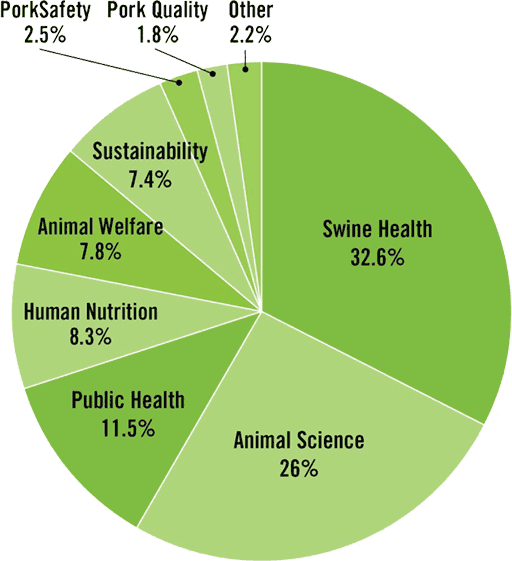News from the National Pork Board (March 2018)
US pork producers receive a positive return on their Checkoff investment, according to a 2017 study conducted and released by Harry Kaiser, the Gellert Family Professor in the Dyson School of Applied Economics and Management, Cornell University. Additionally, 91% of pig farmers who took part in the Pork Checkoff’s annual producer survey in November 2017 acknowledged their overwhelming support of the Pork Checkoff, with a record-low opposition of just 3%.
The National Pork Board commissions an economic analysis of Pork Checkoff programs every five years. The study quantifies the returns generated by Pork Checkoff investments in research, pork promotion and producer education programs. The latest results, published in 2017, cover 2011 to 2016 programs.
“It’s important to producers – those who directly fund the Pork Checkoff – to understand and quantify the value of their investments,” said Terry O’Neel, National Pork Board president and a pig farmer from Friend, Nebraska. “The results indicate a positive impact of all aspects of the Pork Checkoff, from conducting production-focused research to growing consumer and export demand for pork.”
Specifically, the study documented a growing return on investment through defined benefit-cost ratios across several key program areas from 2011 to 2016:
- Production research: Each dollar invested in production research to benefit on-farm practices yielded $83.30 in producer value.
- Foreign market development: Each dollar invested in developing foreign markets yielded $24.70 in producer benefits.
- Advertising and non-advertising promotion: Other pork promotion resulted in benefits of $14.20 for advertising and $12.40 for non-advertising promotion.
- Research to grow demand: Research on market drivers returned $8.30 for each $1 invested.
- Net result: Collectively, the overall return of Checkoff program activities is $25.50 for each dollar invested.
The US Department of Agriculture requires a return on investment analysis every five years. The 2001 to 2006 study showed an overall return of $13.80 to $1 invested, and the most previous study, released in 2012 for the period of 2006 to 2011, found a return of $17.40 to $1 invested.
For more information, contact Kevin Waetke at KWaetke@pork.org or 515-223-2638.
Investment breakdown of Checkoff’s scientific studies in 2017
In 2017, of the various science-based research studies recommended for funding by the producer-led committees, the National Pork Board approved 57 of them for a total Checkoff investment of $4.73 million. These studies focus primarily on seeking on-farm solutions to today’s production challenges. This graphic shows the share of the total investment for each research area for the year.

For more information, contact Dave Pyburn, DPyburn@pork.org or 515-223-2634.
New pork.org offers improved functionality
With the recent overhaul of its look and feel, the National Pork Board’s pork.org website offers users an enhanced experience with better capabilities. Most notably, the ability to find research items has been improved and now more than 20 individual National Pork Board sites fall under the domain of pork.org.
The launch topped off work throughout 2017 by the Pork Checkoff’s digital strategy team on the consolidation project. The result? For the first time, pork.org now serves as a single online resource for pork producers and all of the Pork Checkoff’s key audiences.
“The overarching goal is to provide a single source of information at pork.org for all pork website users and to give them an outstanding user experience,” said Kevin Waetke, vice president of strategic communications for the Pork Checkoff and co-leader of the digital strategy team.
For more information, contact Kevin Waetke at KWaetke@pork.org or 515-223-2638.
Pig survivability: Key research area in 2018
The Checkoff’s Animal Science Committee has determined that improving pig survivability is a key area of research for 2018. With additional research dollars from the Checkoff Animal Welfare Committee, the committee has devoted $1 million in Checkoff funds for this effort. In addition, the committee submitted a proposal on improving pig survivability to the Foundation for Food and Agriculture Research (FFAR) that seeks matching funds. FFAR subsequently committed $1 million in matching funds for this research. Its goal is to get a better understanding of the underlying drivers of pig mortality that will lead to improved production efficiency and profitability.
For more information, contact Chris Hostetler, CHostetler@pork.org or 515-223-2606.